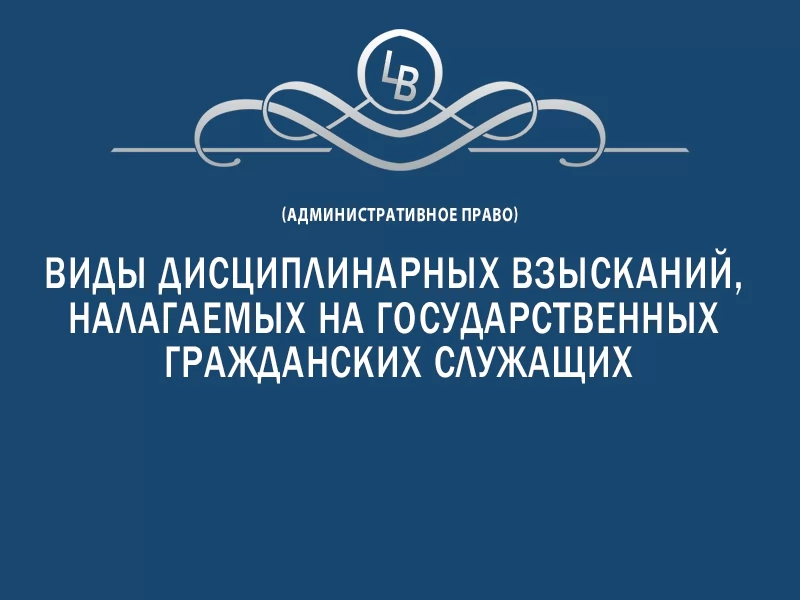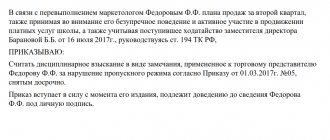Appealing a disciplinary sanction to a military personnel in court is not a simple matter. Get the highlights of useful tips from this material
ATTENTION: in case of an illegal reprimand, you may need help and protection of conscripts and military personnel who are serving under a contract from our military lawyer.
Grounds for disciplinary action
Military discipline may be violated by one of the following types of offenses:
- intentional;
- careless;
- rude;
- small.
Intention is understood as when a person who has committed or is committing an offense is aware of his actions, and therefore understands the consequences and what his actions or inactions can lead to. If the serviceman did not suspect the impending consequences of his actions, then his offense can be considered not intentional.
Minor offenses can be understood as actions (or inaction) as a result of which no harm was caused to the order or to unauthorized persons. For example, you can indicate: being late for service, not a gross violation of the regime of a military unit.
More serious offenses include the following:
- hazing in the unit;
- leaving the territory of a military unit without the permission of the commander, with the exception of officers;
- failure to appear from dismissal or hospital on time;
- absence from the place of duty for more than 4 hours without good reason;
- failure to appear at the military registration and enlistment office;
- violation of the order of combat duty, border, guard service, patrol, and protection of public order;
- improper handling of ammunition, weapons, equipment, if damage is caused to military personnel or property of a military unit;
- violations of traffic rules and rules for driving a car and heavy equipment, if negligence caused harm to military personnel or property;
- being on duty under the influence of alcohol or drugs.
The procedure for applying disciplinary arrest to military personnel
The procedure for applying a disciplinary sanction in the form of disciplinary arrest to military personnel for committing a gross disciplinary offense is regulated by federal laws of December 1, 2006 No. 199-FZ “On legal proceedings based on materials about gross disciplinary offenses when applying disciplinary arrest to military personnel and on the execution of disciplinary arrest,” dated March 28, 1998 No. 53-FZ “On military duty and military service”, dated May 27, 1998 No. 76-FZ “On the status of military personnel” and the Disciplinary Charter of the Armed Forces of the Russian Federation (Decree of the President of the Russian Federation dated November 10, 2007 No. 1495) . The legislation of the Russian Federation provides exclusively for the judicial procedure for applying this type of disciplinary sanction to military personnel. The initiation of a corresponding petition before the court must be preceded by a trial on the fact of a gross disciplinary offense, which is carried out by decision of the unit commander (chief of the military police body), who appoints the person responsible for its conduct. The investigation, as a rule, is carried out by the immediate commander (superior) of the serviceman who committed a disciplinary offense in order to identify those responsible, identify the reasons and conditions that contributed to its commission. Based on the results, a protocol of the established form is drawn up. The serviceman in respect of whom the protocol has been drawn up must be familiar with it and have the right to submit comments on its content, which are attached to the protocol. The protocol is signed by the person who compiled it and the serviceman in respect of whom it was drawn up, after which, together with the materials of the proceedings and the proposal for the period of disciplinary arrest (other type of punishment), it is presented to the commander of the military unit (chief of the military police body). A copy of the protocol against signature is given to the serviceman in respect of whom it was drawn up.
During the proceedings, the following must be established: the event of the disciplinary offense (time, place, method and other circumstances of its commission);
the person who committed the disciplinary offense; the serviceman’s guilt in committing the disciplinary offense, the form of guilt and motives;
data characterizing the personality of the serviceman who committed a disciplinary offense;
the presence and nature of harmful consequences;
circumstances excluding, mitigating and aggravating disciplinary liability;
the nature and degree of participation of each serviceman in the commission of a disciplinary offense by several persons;
reasons and conditions that contributed to the commission of a disciplinary offense;
other circumstances relevant for the correct resolution of the issue of bringing to disciplinary liability.
The severity of the penalty increases if the disciplinary offense was committed while on combat duty (combat service) or while performing other official or special duties, while intoxicated, or if its consequence was a significant violation of internal order.
The right to apply for disciplinary arrest against a serviceman is granted to commanders (chiefs) from the squad commander and above or to the person who conducted the proceedings.
The authority to send materials about gross disciplinary offenses to the garrison military court for making a decision on the application of disciplinary arrest belongs to the commander of the military unit and the head of the military police body.
A lawyer, whose powers are certified by a warrant of legal education, is allowed to participate as a defense attorney in proceedings on materials regarding a gross disciplinary offense.
Materials about a gross disciplinary offense are considered by the judge of the garrison military court alone within three days from the date of their receipt by the garrison military court. If the serviceman in respect of whom the documents were sent is under arrest or detained, they are considered directly on the day of receipt.
Based on the results of the judicial review, the judge of the garrison military court may make one of the following decisions:
1) on the appointment of disciplinary arrest;
2) on the refusal to impose disciplinary arrest and on the return of materials to the commander of the military unit (the head of the military police body), who sent them to the garrison military court, for the application of another disciplinary measure in cases where disciplinary arrest cannot be applied to the military man;
another disciplinary measure may be applied based on the circumstances of the disciplinary offense, its consequences, the form of guilt and the personality of the serviceman;
3) on the termination of proceedings based on materials about a gross disciplinary offense in the following cases: if there is one of the circumstances that excludes disciplinary liability of a military serviceman; transfer of materials to the head of the military investigative body, if the action (inaction) of the serviceman contains sufficient data indicating signs of a crime, and a decision to release the serviceman from criminal liability in the manner prescribed by law has not been made.
The judge’s decision to apply disciplinary arrest to a military serviceman is announced immediately after the decision is made and for immediate implementation on the same day it is sent to the official authorized to execute it.
Senior military prosecutor of the 1st department of organizational management of the Main Military Prosecutor's Office, Colonel of Justice O.V. Kolbasenkov
Photo: Russian Ministry of Defense
Types of disciplinary sanctions
For violation of discipline, the following measures may be taken against guilty military personnel:
- reprimand or severe reprimand;
- deprivation of dismissal;
- deprivation of a badge;
- warning;
- demotion in position or rank (by step);
- dismissal from service before the end of the contract;
- expulsion from a military school or university;
- deduction from fees;
- disciplinary arrest (no longer than 45 days).
The following cannot be arrested:
- officers;
- conscripts who did not take the military oath;
- minors;
- military personnel.
Disciplinary sanctions applied to warrant officers and midshipmen
61.The following types of disciplinary sanctions may be applied to warrant officers and midshipmen:
a) reprimand;
b) severe reprimand;
c) warning about incomplete official compliance;
d) reduction in military rank;
e) early dismissal from military service due to failure to fulfill the terms of the contract;
f) disciplinary arrest.
For female military personnel performing military service as warrant officers and midshipmen , the penalty provided for in paragraph “e” of this article does not apply.
The rights of commanders (chiefs) to apply disciplinary sanctions to warrant officers and midshipmen subordinate to them
62. The platoon (group ) commander, company commander (combat boat, rank 4 ship), battalion commander have the right to issue a reprimand and severe reprimand.
The commander of a separate battalion (ship of the 2nd and 3rd rank), as well as the commander of a separate military unit , who, in accordance with Article 11 of this Charter, enjoys the disciplinary power of the battalion commander, in addition, have the right to warn about incomplete service compliance.
63. The commander of a regiment (ship of 1st rank) has the right:
a) issue a reprimand and severe reprimand;
b) warn about incomplete official compliance.
64. The division commander and corps (squadron) commander have the right:
a) issue a reprimand and severe reprimand;
b) warn about incomplete official compliance;
c) reduce in military rank.
65. The commander of an army (flotilla) has the right:
a) issue a reprimand and severe reprimand;
b) warn about incomplete official compliance;
c) reduce in military rank;
d) early dismissal from military service due to failure to fulfill the terms of the contract.
66. The commanders of the troops of the military district, front, fleet and their peers in relation to the warrant officers and midshipmen subordinate to them have the right to apply disciplinary sanctions to the full extent of this Charter.
Disciplinary sanctions applied to officers
67.The following types of disciplinary sanctions may be applied to junior and senior officers:
a) reprimand;
b) severe reprimand;
c) warning about incomplete official compliance;
d) reduction in military rank;
e) early dismissal from military service due to failure to fulfill the terms of the contract.
68.The following types of disciplinary sanctions may be applied to senior officers:
a) reprimand;
b) severe reprimand;
c) warning about incomplete official compliance;
d) reduction in military rank.
The rights of commanders (chiefs) to apply disciplinary sanctions to officers subordinate to them
69. The company commander (combat boat, rank 4 ship) and the battalion commander have the right to issue a reprimand and severe reprimand.
The commander of a separate battalion (ship of the 2nd and 3rd rank), as well as the commander of a separate military unit , who, in accordance with Article 11 of this Charter, enjoys the disciplinary power of the battalion commander, in addition, have the right to warn about incomplete service compliance.
70. The regiment commander (ship of the 1st rank) and the division commander have the right:
a) issue a reprimand and severe reprimand;
b) warn about incomplete official compliance.
71. The commander of a corps (squadron) and the commander of an army (flotilla) in relation to junior and senior officers have the right:
a) issue a reprimand and severe reprimand;
b) warn about incomplete official compliance.
In relation to senior officers, the corps (squadron) commander has the right to issue a reprimand and severe reprimand, and the army (flotilla) commander, in addition, warns about incomplete service compliance.
72. Commanders of troops of a military district, front, fleet and their equals have the right:
in relation to junior and senior officers:
a) issue a reprimand and severe reprimand;
b) warn about incomplete official compliance;
c) demote officers from battalion commanders, equals and lower in military rank;
d) early dismissal from military service due to failure to fulfill the terms of the contract of officers from company commanders, commanders of combat boats and ships of rank 4, their peers and below;
in relation to senior officers:
a) issue a reprimand and severe reprimand;
b) warn about incomplete official compliance.
73. Deputy Ministers of Defense, commanders-in-chief of branches of the Armed Forces of the Russian Federation and their equals , in addition to the rights granted to the commander of the troops of a military district, front, fleet and their equals, have the right:
a) demote in military positions officers from deputy regiment commanders, senior assistant commanders of ships of the 1st rank, their peers and below;
b) early dismissal from military service due to failure to fulfill the terms of the contract of officers from battalion commanders, their equals and below.
Disciplinary sanctions applied to citizens called up for military training
74. Disciplinary sanctions may be applied to citizens called up for military training in full, with the exception of those provided for in paragraphs “c” and “d” of Article 55, paragraph “d” of Article 61 and paragraph “e” of Article 67 of this Charter. In addition, a disciplinary sanction may be applied to them - deduction from military training.
The procedure for issuing a reprimand to a military personnel or other punishment
In this case, a trial is first scheduled, the result of which will be evidence of the guilt or innocence of the serviceman. Based on all the evidence, a penalty is imposed. When assigning a type of punishment, the unit commander must take into account:
- the offense was committed intentionally or carelessly;
- what consequences did it entail (severe or minor);
- characterization of the perpetrator's personality.
Penalty is applied no later than 10 days from the date of transfer of materials.
Legislative framework of the Russian Federation
canceled/voided Edition dated 30.06.2002
detailed information
| Name of document | “DISCIPLINARY CHARTER OF THE ARMED FORCES OF THE RUSSIAN FEDERATION” (approved by Decree of the President of the Russian Federation dated December 14, 1993 N 2140) (as amended on June 30, 2002) |
| Document type | list, order, decree, charter |
| Receiving authority | President of the Russian Federation |
| Document Number | 2140 |
| Acceptance date | 01.01.1970 |
| Revision date | 30.06.2002 |
| Date of registration with the Ministry of Justice | 01.01.1970 |
| Status | cancelled/lost force |
| Publication |
|
| Navigator | Notes |
“DISCIPLINARY CHARTER OF THE ARMED FORCES OF THE RUSSIAN FEDERATION” (approved by Decree of the President of the Russian Federation dated December 14, 1993 N 2140) (as amended on June 30, 2002)
The procedure for imposing disciplinary sanctions
85. A serviceman who has violated military discipline or public order may be subject to only those disciplinary sanctions that are defined in this Charter and correspond to the military rank of the serviceman and the disciplinary authority of the commander (chief) who decides to bring the perpetrator to disciplinary liability.
86. The decision by the commander (chief) to impose a disciplinary sanction on a subordinate must be preceded by a trial. It is carried out in order to identify the perpetrators, identify the causes and conditions that contributed to the commission of the offense.
During the proceedings, the commander (chief) establishes: whether an offense actually occurred; where, when, under what circumstances and for what purpose was it committed; what he expressed himself in; the presence of guilt in the action (inaction) of specific persons and the degree of guilt of each in the event of an offense committed by several persons; what are the consequences of the offense; circumstances mitigating and aggravating the responsibility of the guilty person; reasons and conditions that contributed to the commission of the offense.
If during the proceedings it turns out that the serviceman’s misconduct contains elements of a crime, the commander of the military unit notifies the military prosecutor,, if necessary, initiates a criminal case and orders an inquiry.
87. When determining guilt and disciplinary measures, the following are taken into account: the nature of the offense, the circumstances in which it was committed, its consequences, the previous behavior of the perpetrator, as well as the duration of his military service and the degree of knowledge of the procedure for performing service.
The severity of the disciplinary sanction increases if the offense was committed while on combat duty (combat service) and in the performance of other official duties, while intoxicated, or if it resulted in a significant violation of order.
88. The imposition of a disciplinary sanction on a serviceman who has committed an offense is carried out, as a rule, within 24 hours, but no later than 10 days from the day when the commander (superior) became aware of the offense committed. When imposing a disciplinary sanction, the commander (chief) must not humiliate the personal dignity of the subordinate and allow rudeness.
A warning, remark or strict indication of omissions in service expressed by a commander (chief) to a subordinate is not a disciplinary sanction.
A serviceman who considers himself innocent has the right to file a complaint within 10 days from the date of imposition of a disciplinary sanction.
89. The imposition of a disciplinary sanction on a serviceman who is part of a daily detachment (on combat duty), for offenses committed by him during service, is carried out after a change from the detachment (combat duty) or after replacing him with another military personnel, but not earlier than after day.
90. The imposition of a disciplinary sanction on a serviceman who is in a state of intoxication, as well as obtaining any explanations from him, is postponed until he sobers up. In these cases, if necessary, he can be placed in a guardhouse or in a temporary detention cell for up to one day, after which a decision is made on his responsibility.
91. It is prohibited to impose several disciplinary penalties for the same offense or to combine one penalty with another, or to impose penalties on the entire personnel of a unit instead of punishing the direct culprits.
(as amended by Decree of the President of the Russian Federation dated June 30, 2002 N 671)
92. If the commander (chief), due to the gravity of the offense committed by a subordinate, considers the disciplinary power granted to him insufficient, he initiates a petition to impose a penalty on the perpetrator by the authority of the senior commander (chief).
A commander (chief) who has exceeded the disciplinary authority granted to him bears responsibility for this.
93. A senior commander (chief) does not have the right to cancel or reduce a disciplinary sanction imposed by a junior commander (chief) due to the severity of the penalty, if the latter has not exceeded the authority granted to him.
The senior commander (chief) has the right to cancel a disciplinary sanction imposed by a junior commander (chief) if he finds that this sanction does not correspond to the gravity of the offense committed, and to impose a more severe penalty.
94. A military serviceman subjected to disciplinary action for a crime committed and material damage caused to the state is not exempt from criminal and material liability.
The procedure for appealing a disciplinary sanction for military personnel
If you need to appeal an order to impose disciplinary liability, please note that a complaint can only be filed within 10 days from the date of application of the penalty. When defending your rights, you should rely on the Federal Law “On the Status of Military Personnel” No. 21 of 1998.
A citizen has the right to file a complaint against an unlawful, from his point of view, penalty to the superiors of the person who considered it possible to impose such a penalty. If in this case it was not possible to appeal the reprimand to the serviceman and prove that he was right, the citizen has the right to submit a corresponding application to a military court.
The deadline for filing documents with the court is 30 days from the date of imposition of the penalty. This approach makes it possible to first contact competent persons, and only then, without unnecessary haste, to the judicial authorities. They can also file a complaint with the Military Court about a violation of the charter or about the fact that compensation for housing was not paid to the military; such a right is granted to a citizen by the Code of Administrative Proceedings of the Russian Federation.
In addition, appealing a disciplinary sanction by a military personnel is also possible with the help of a military prosecutor, to whom a citizen whose rights have been violated can send a complaint, which will detail the essence of the problem. The military prosecutor's office is contacted with a statement of violation of the right to provide housing for military personnel after dismissal.
The legislation does not provide for a time limit for such treatment. At the same time, a citizen is not obliged to inform his superiors about his intentions.
If the procedure for appealing a disciplinary sanction by a serviceman was followed, and the decision on the appeal was made in favor of the citizen, the authorities must not only sign an order to cancel the sanction, but also cancel the decisions on deprivation of bonuses and other preventive measures caused by the disciplinary sanction.
Types of disciplinary sanctions imposed on state civil servants

Chikhireva Alina Viktorovna, master's student
Kursk State University
Abstract
. This article discusses the types of disciplinary sanctions imposed on state civil servants for committing a disciplinary offense. The concepts of disciplinary action, reprimand, reprimand, warning about incomplete official compliance are defined. Judicial practice is given as an example. Each disciplinary sanction was analyzed, indicating shortcomings in its application. In addition, the text of Art. 57 of the Federal Law “On the State Civil Service of the Russian Federation” was checked for the presence of corruption factors in it in accordance with the Methodology for conducting the examination of regulatory legal acts and draft documents, approved by the Decree of the Government of the Russian Federation of February 26, 2010 No. 96 “On the anti-corruption examination of regulatory legal acts and draft regulations legal acts". Possible changes to the legislation on the state civil service of the Russian Federation are proposed in order to eliminate possible corruption factors.
Keywords
: state civil service, state civil servant, disciplinary action, misconduct, reprimand, reprimand, warning of incomplete official compliance, dismissal.
A disciplinary sanction is a disciplinary measure imposed for committing a disciplinary offense related to the failure or improper performance by an employee of his official duties.
Relations related to the application of disciplinary sanctions to a state civil servant are regulated primarily by the Federal Law “On State Civil Service” [1]. Article 57 of the law provides that for committing a disciplinary offense, the representative of the employer of a state civil servant has the right to apply the following types of disciplinary sanctions: - reprimand; - reprimand; — warning about incomplete job compliance; — dismissal from the civil service on the grounds provided for by the Federal Law “On the State Civil Service in the Russian Federation.”
Disciplinary sanctions are imposed in order to ensure compliance with official regulations, prevent subsequent disciplinary offenses, and punish state civil servants who have committed these offenses [2].
Let us consider in detail each type of disciplinary action.
When determining the specific type of penalty to be applied, the following criteria established by law are taken into account:
a) the nature and severity of the violation committed; b) the circumstances under which the violation was committed; c) compliance by the employee with other prohibitions, performance of other duties established for the purpose of combating corruption; d) previous results of the employee’s performance of his duties
A reprimand is the mildest type of disciplinary punishment. The reason for its application to an employee of the state civil service is the commission of a minor or isolated offense. Submitted in writing. The law does not explain in detail the concepts and does not define the types of disciplinary sanctions; accordingly, it does not indicate which act can be considered insignificant. Therefore, the employer’s representative will independently decide on the type of punishment in each specific case.
A review of judicial practice shows that courts classify as minor acts offenses in which a state civil servant, for example, did not indicate in the declaration the income received from teaching, scientific and other creative activities, also if information is not indicated that the state civil servant participated in in a commercial organization, while the relevant organization has had no economic activity for 3 or more years preceding the filing of the Certificate, and there is no doubt that there is no corruption component in the actions (inaction) of the employee. A minor act is also recognized as unspecified information in the declaration about income received from a bank deposit, the amount of which does not exceed 10,000 rubles, but at the same time the declaration displays complete and reliable information about the existence of such a deposit (account) [3].
In addition, an act may be considered insignificant when a state civil servant did not properly fulfill his official duties, but this did not entail a violation of the rights of citizens, organizations, etc.
For example, leading specialist-expert of the department of state land supervision of the Rosreestr department for the Kursk region Zvyagintsev A.A. By visually inspecting land plots from the outside, analyzing data from automated management information resources, and taking photographs, an administrative inspection of the land relations object was carried out: a land plot with an area of 500 sq.m. with cadastral number, located at the address: <address> category of land in settlements, for gardening. Based on the results of the administrative survey, the plaintiff drew up an administrative survey report dated DD.MM.YYYY No.
However, according to the results of an internal inspection on the basis of an order from the head of the Rosreestr department for the Kursk region for violation of the Rules for conducting an administrative survey of land relations objects, approved by Decree of the Government of the Russian Federation of March 18, 2015 No. 251, which expressed that Zvyagintsev A.A. During the administrative survey, a land plot with cadastral number was not clearly identified on the ground and its exact location was not established, as a result of which an administrative survey report was erroneously drawn up and a citizen was summoned to draw up a protocol on an administrative offense; a disciplinary sanction was applied to the plaintiff in the form of a remark. The court found the actions of the employer’s representative justified [4].
The next disciplinary sanction is a reprimand. This is a more severe disciplinary measure. The legislator also did not clearly establish a list of violations for which a reprimand can be applied. But we can definitely say that it is imposed for more serious offenses compared to those for which a reprimand is issued. In general, a reprimand can be issued for failure of a state civil servant to comply with official regulations, violation of administrative law and order by a state civil servant outside of working hours, etc.
Warning for incomplete compliance - such a disciplinary sanction is already considered a serious punishment; it is often issued for repeated violations, after which milder disciplinary measures have already been applied to the civil servant. The essence of this penalty is that the employee is warned of the need to significantly improve the performance of his official duties and further prevent violations of the law and official discipline. The conclusion about incomplete official compliance is formed based on the results of a performance audit or certification, which suggests that this type of penalty is typical for civil servants with an insufficient level of qualifications, level of knowledge, and low personal discipline.
Judicial practice also shows that a warning about incomplete official compliance is applied for failure to comply with measures to prevent state civil servants from conflicts of interest.
Thus, police lieutenant colonel Adoevsky E.V., being the immediate superior of Full Name 7, did not take measures to prevent the possibility of a conflict of interest arising in connection with the filling of Full Name 7 with the position of senior inspector for special assignments of the department for control over private security activities of the TsLRR Directorate of the Russian Guard for the Kursk Region and the presence of related connections in the person of the brother of the director of Kursk Security Agency LLC, in connection with which the court found that Adoevsky E.V. reasonably subjected to disciplinary action in the form of a warning about incomplete official compliance [5].
Dismissal from the civil service on the grounds established by paragraph 2, subparagraphs “a” - “d” of paragraph 3, paragraphs 5 and 6 of part 1 of article 37 of the Federal Law “On the State Civil Service in the Russian Federation”. According to the paragraphs of this article, dismissal of a state civil servant is possible on the following grounds:
— repeated failure by a civil servant to perform official duties without good reason, if he has a disciplinary sanction; - one-time gross violation of official duties by a civil servant:
a) absenteeism (absence from work without good reason for more than four hours in a row during a work day); b) appearing at work in a state of alcoholic, narcotic or other toxic intoxication; c) disclosure of information constituting state and other secrets protected by federal law, and official information that has become known to a civil servant in connection with the performance of his official duties; d) theft (including small) of someone else’s property, embezzlement, intentional destruction or damage to such property at the place of duty, established by a court verdict that has entered into legal force or a resolution of the body authorized to consider cases of administrative offenses;
- adoption by a civil servant holding a civil service position in the “managers” category of an unfounded decision that entailed a violation of the safety of property, its unlawful use or other damage to the property of a state body; - a single gross violation by a civil servant holding a civil service position in the “managers” category of his official duties, resulting in harm to a government agency and (or) violation of the legislation of the Russian Federation.
In this case, we see that the legislator has provided a specific list of violations for which a civil servant can be dismissed. The employer's representative here cannot make a decision on dismissal based only on his own opinion, as when applying other types of disciplinary sanctions.
So, having analyzed the types of penalties for state civil servants, we came to the conclusion that in the event of a disciplinary offense, the employer’s representative independently determines the type of punishment in the form of a remark, reprimand or warning of incomplete compliance, depending on the specific situation and in relation to a specific employee . It should be noted that the lack of regulation in the law of the list of possible situations for which one or another punishment should be imposed gives the employer’s representative a breadth of discretionary powers - that is, the opportunity to act at his own discretion depending on the circumstances, which can be considered a corruption-generating factor in accordance with the Methodology conducting an examination of regulatory legal acts and draft acts approved by the Decree of the Government of the Russian Federation [6]. However, this type of penalty such as dismissal from the civil service provides a clear list of possible official misconduct for which dismissal follows. We believe that such lists need to be regulated for other penalties in order to exclude possible corruption factors or bias of the employer’s representative towards a certain employee.
Bibliography
1. Federal Law dated July 27, 2004 No. 79-FZ “On the State Civil Service of the Russian Federation” // Collection of Legislation of the Russian Federation dated August 2, 2004, No. 31. Art. 3215. 2. Starilov Yu.N. General administrative law: textbook: in 2 hours - Part 2. Voronezh. 2021. P. 254. 3. Letter of the Ministry of Labor dated March 21, 2016 No. 18-2/10/P-1526 “On the criteria for holding accountable for corruption offenses” (together with the “Review of the practice of holding state (municipal) employees accountable for failure to comply with restrictions and prohibitions, requirements to prevent or resolve conflicts of interest and failure to fulfill obligations established for the purpose of combating corruption”). 4. Decision of the Leninsky District Court of the city of Kursk dated June 14, 2018 in case No. M-1100/2018 M // Website “Judicial and regulatory acts of the Russian Federation” [HTML] https://sudact.ru/ (date of access: 05/25/2021) . 5. Decision of the Leninsky District Court of the city of Kursk dated 02.11.2020 No. 2-203/2020 // Website “Judicial and regulatory acts of the Russian Federation” [HTML] https://sudact.ru/ (date of access: 05.25.2021). 6. Decree of the Government of the Russian Federation dated 02.26.2010 No. 96 “On anti-corruption examination of normative legal acts and draft normative legal acts” // Collection of Legislation of the Russian Federation dated 07.08.2010, No. 10. Art. 1084.
When is disciplinary action prohibited?
In a number of cases, when, after conducting an inspection, the commander can identify circumstances that will exclude the possibility of applying disciplinary sanctions to military personnel. A serviceman cannot be held accountable for actions or inaction:
- Committed in self-defense and protection of civilians;
- When protecting the state from a dangerous situation for it;
- Related to the detention of criminals for their subsequent transfer to authorities;
- If their benefit to society has been proven, and the purpose of the committed act was to prevent unfavorable events that pose a threat to the life, health, interests of citizens or the state;
- They were committed under duress, as a result of which the serviceman could not fully control himself and control his actions.
They also cannot; they are allowed to be held accountable if there is no direct evidence that confirms that an offense has been committed.
ATTENTION: watch a video with tips on how to get housing for military personnel, terminate a contract and defend your right. Subscribe to our YouTube channel and through the comments to the video you can consult a military lawyer for free to solve your problem.
Procedure for execution of disciplinary sanctions
The execution of disciplinary sanctions can begin at any time, as long as the statute of limitations has not expired. Its omission makes it impossible to bring to justice, however, a record of the penalty will in any case appear in the violator’s service card.
The judge's decision on any disciplinary sanction is executed immediately after it comes into force. The exception is the arrest order - it is executed after it is issued.
Note!
Arrest applies only to persons whose health condition allows them to endure such a severe punishment.
A complaint filed against a disciplinary sanction does not suspend its execution. An exception is the presence of an order from a commander (chief) or a decision of a higher court.
The arrest order is considered executed:
- after the serviceman has fully served his assigned term of disciplinary arrest;
- upon early termination of execution of a sentence.
The grounds for early termination are:
- reversal of the decision on the imposed penalty;
- repeal or invalidation of the law or its individual provisions regarding the responsibility of military personnel for misconduct;
- cancellation, recognition as invalid of the provisions of the law, regulatory act that were violated by the military personnel;
- death of the person held accountable;
- recognition of the person brought to justice as missing, declaring him dead, in accordance with the established judicial procedure;
- exclusion of the person brought to justice from the list of personnel of the military unit.
In addition, early termination of arrest is possible:
- when the health of the guilty person is unsatisfactory, when he cannot be under arrest for objective reasons;
- if it is necessary for the presence of a serviceman in the family, when this is caused by tragic events (death of loved ones, natural disaster from which relatives suffered, etc.);
- when involving the culprit in combat service, exercises, liquidation of consequences of emergency situations, etc.






